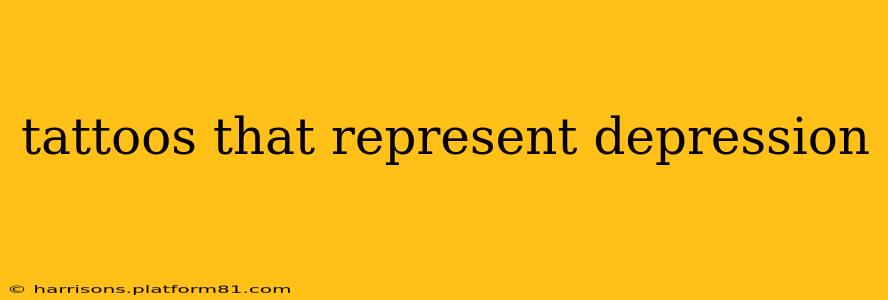Depression, a pervasive and often misunderstood condition, affects millions worldwide. For some, expressing the complexities of this internal struggle through body art offers a powerful form of self-expression and healing. This exploration delves into the symbolic meanings behind tattoos representing depression, considering the diverse imagery and personal narratives they embody. We'll also address frequently asked questions surrounding this sensitive topic.
What are some common tattoo designs that represent depression?
The imagery used to represent depression in tattoos is incredibly diverse, reflecting the multifaceted nature of the experience. There isn't one single "depression tattoo," but rather a range of designs chosen for their personal resonance. Some common themes include:
-
Dark imagery: Black ink, dark colors, and shadowy designs can symbolize the darkness and negativity associated with depression. This might include blackwork tattoos, intricate dark floral pieces, or even abstract shapes filled with deep shadows.
-
Nature-inspired designs: While seemingly contradictory, nature can be a powerful metaphor. Wilting flowers, cracked earth, or stormy seas can visually represent the emotional turmoil and decay experienced during depressive episodes. Conversely, elements like a slowly budding flower or a sunrise could represent hope and the journey towards recovery.
-
Semicolons: The semicolon tattoo is a popular symbol of mental health awareness, particularly for depression and suicide prevention. It represents the continuation of a sentence—a life—that could have ended.
-
Abstract designs: Many individuals opt for abstract designs that evoke the feeling of depression without explicitly depicting it. This allows for personal interpretation and a deeper connection to the meaning behind the art.
-
Animal symbolism: Certain animals, such as black birds (often crows or ravens) or owls, are often associated with darkness, solitude, and introspection, themes that resonate with many experiencing depression.
It's crucial to understand that the meaning of a tattoo is entirely personal. What one person uses to represent their struggle, another might find entirely irrelevant.
What does a semicolon tattoo mean for depression?
The semicolon tattoo has become a powerful symbol of hope and resilience within the mental health community. The semicolon represents the unfinished sentence of a life interrupted by suicidal thoughts; it signifies a conscious choice to continue. This design offers a message of perseverance and solidarity to those who have battled, and continue to battle, with depression and suicidal ideation. It's a mark of survival and a testament to the strength it takes to keep going.
Are there any tattoos that symbolize overcoming depression?
Yes, many people choose tattoos that reflect their journey towards recovery and healing. These designs often incorporate elements of hope, growth, and transformation. Some examples could include:
- Brightly colored flowers blooming: Representing growth and resilience after a period of darkness.
- Phoenix rising from ashes: A classic symbol of rebirth and overcoming adversity.
- Sun and moon combinations: Symbolising the balance between darkness and light, and the acceptance of both aspects of oneself.
- Positive affirmations or quotes: Adding words of encouragement or inspiration can provide a personal reminder of strength and hope.
These designs serve as visual reminders of the progress made and the ongoing journey towards wellness.
How can I choose a tattoo that authentically represents my experience with depression?
Choosing a tattoo that truly reflects your experience with depression requires thoughtful consideration. Spend time reflecting on your feelings and experiences. Consider what aspects of depression you want to portray—the darkness, the struggle, the hope for recovery, or a combination thereof.
- Sketching and journaling: Start by sketching ideas, writing down emotions, and searching for imagery that resonates with you.
- Researching artists: Find an artist whose style aligns with your vision and who understands the sensitive nature of the subject matter. It's invaluable to find an artist who specializes in meaningful and personal tattoo design.
- Seeking professional support: Discuss your idea with a therapist or counselor who can offer support and guidance as you navigate this significant decision.
Your tattoo should be a powerful and meaningful representation of your personal journey.
Can a tattoo really help with depression?
While a tattoo cannot cure depression, it can serve as a powerful tool for self-expression, coping, and healing. For many, the process of designing and getting a tattoo is therapeutic, providing a tangible way to process and externalize internal struggles. The resulting artwork can serve as a daily reminder of strength, resilience, and the journey towards recovery. Remember to always seek professional mental health support alongside any self-care practices like getting a tattoo.
Remember, the information provided here is for informational purposes only and should not be considered professional medical advice. If you are struggling with depression, please seek help from a qualified mental health professional.
